How Ukraine recognizes its Jewish past? Check a report from one of our tours on National Council on Public History.
Trip with Ruth Ellen Gruber
Ruth Ellen Gruber has posted a full report from our 2-day “reconnaissance” trip in Galicia. Read also her post about new tourist signage in Brody.
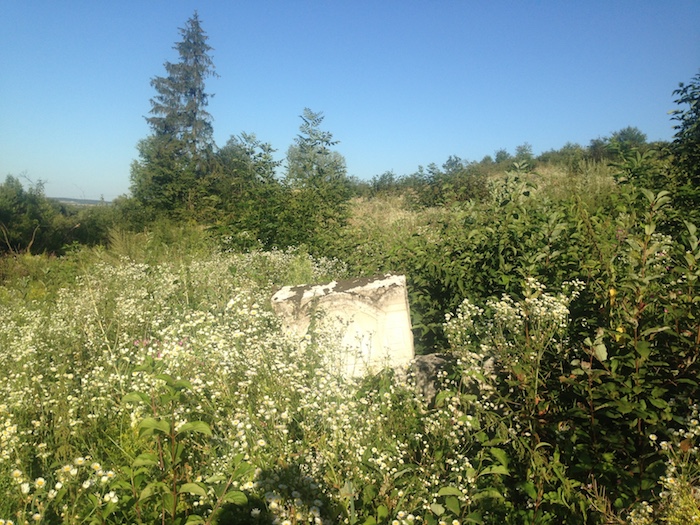
Jewish Cemetery in Shchyrets – almost unaccessible in summer due to overgrown bushes.
Jewish cemetery in Obertyn restored
Good news from Ukraine. In July 2017 Bohdan Stanislavsky, a businessman in Obertyn near Kolomyia, restored and commemorated the Jewish cemetery. Stanislavsky is an owner of the former kolkhoz built by the soviets on the land where the Jewish cemetery once stood. In the course of restoration works, a barn was destroyed. Dozens of tombstones which supported construction of the barn were brought back to the cemetery.
Opening of the memorial was celebrated on July 12th together with rabbi Koleshnik from Ivano-Frankivsk, municipality and local residents.


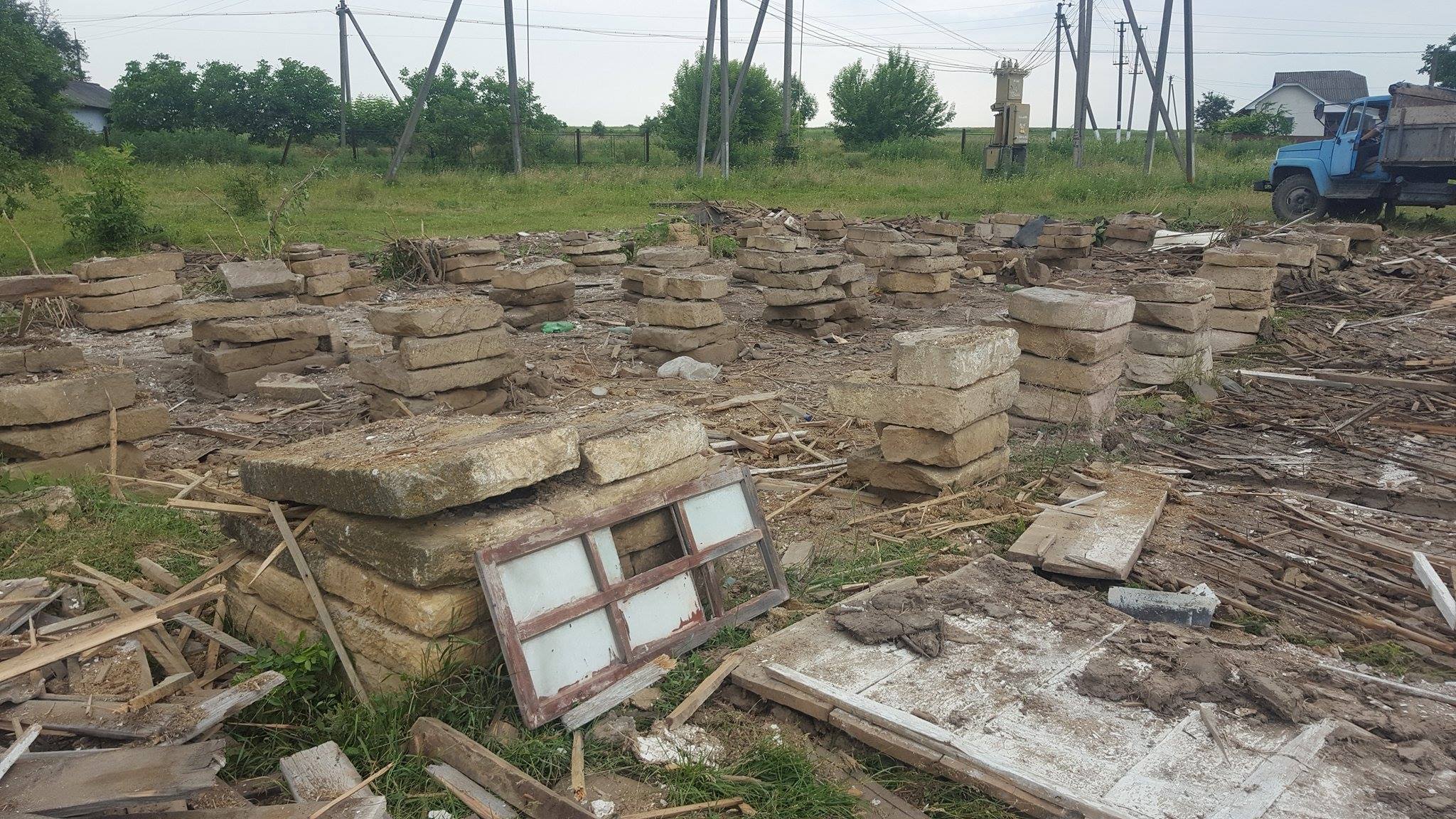
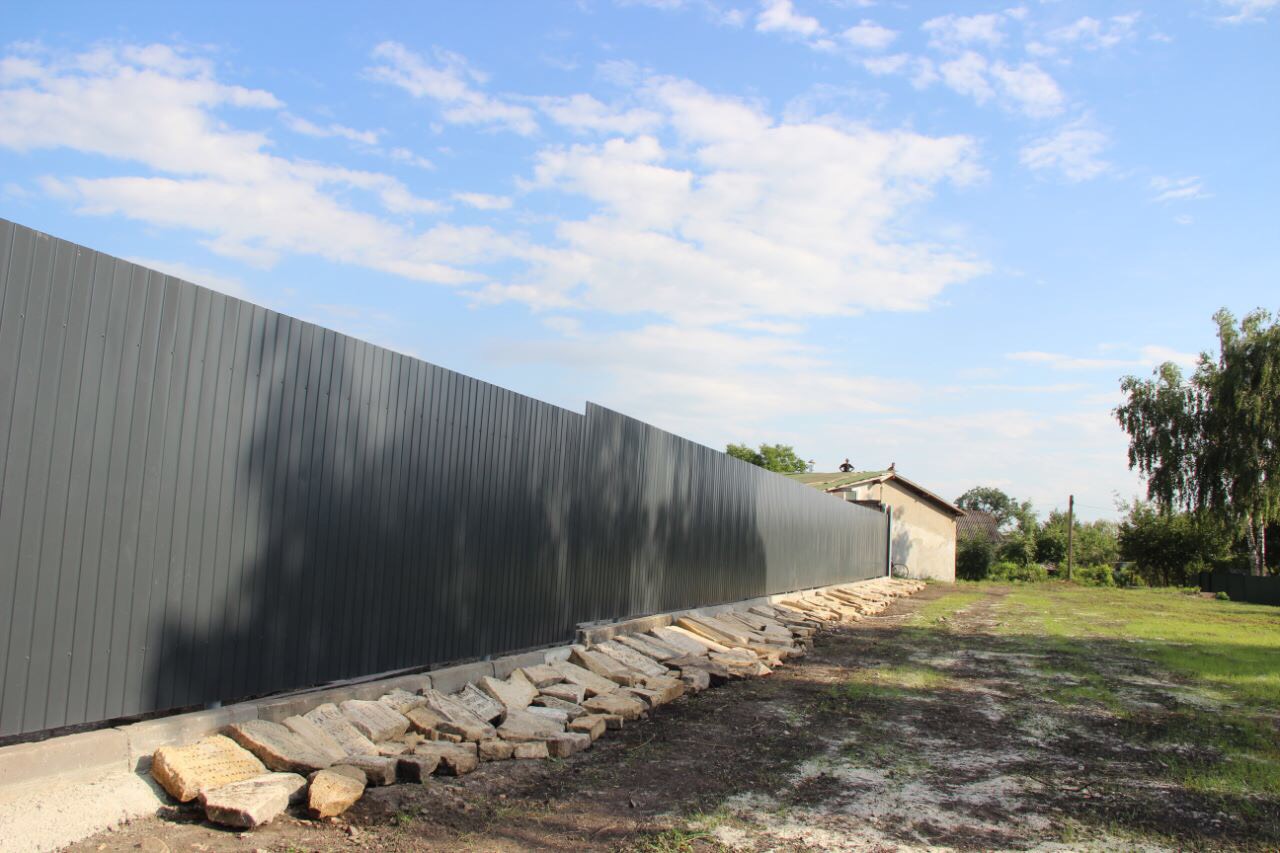
Belowesch. German colonies near Chernihiv
Recently we carried out research on a family of German colonists which settled in Belowesch (Bilovezhі) nearh Chernihiv (Chernigov).
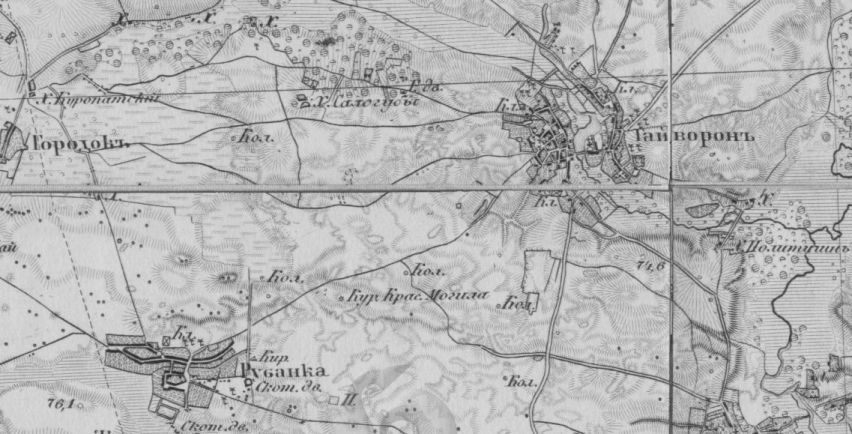
Gorodok (Horodok) near Haivoron, a german collony in Bilovezhi, on a map from 1880.
The colonies were established by the decision of Catherine II. Her idea was to modernize agriculture in the region by creating well managed farms which could serve as an example for local villagers and rise general level of productivity in the area. The ideas were much in spirit of the Enlightment and idea of well managed, absolute state, which emerged in the Western Europe in 18th Century which also the Russian Empire tried to follow. 124 families were granted land on Bilovezha steppe in the district of Borzna in 1767 and 23 families established a town — Gorodok (Horodok). The 23 families were initially involved in crafts, but soon they switched to agriculture. Remaining 124 resided in 5 villages:
- Grosswerder (Velykyi Verder, Великий Вердер, today Zelenivka, Зеленівка),
- Rundewiese (Rundevize, Рундевізе, today Kruhloluhivka, Круглолугівка, does not exist since 2009),
- Kleinwerder (Malyi Verder, Малий Вердер, today Pershotravneve, Першотравневе),
- Belowesch (Bili Vezhi, Білі Вежі, today Bilovezh Pershi, Біловежі Перші),
- Kaltschinowka (Kalchynivka, Кальчинівка, same name today).
The town of Gorodok does not exist anymore, it’s marked on the maps only by the Horodok train station in the middle of forest. In 1951 Gorodok was renamed to Vosmoye Marta (8th of March, Восьмое Марта) and later included in administrative borders of nearby Haivoron.
During the research we localized following documents on the colonies and the colonists in State Archives in Chrnihiv, Odessa and Dnipro (Dnipropetrovsk, Yekaterinoslav). Let us know if you’d like to have these records researched.
Censuses
- Revision list of the merchants, state serfs and colonists in the Borzna district; 1816
- Revision list of the townspersons-colonists and stat serfs; 1854
- Revision list from 1813; 1813
- Revision list from 1815; 1815
Tax records
- On the land tax on colonists from Belowesch colonies; 1810
- On the land tax on colonists from Belowesch colonies; 1811
- On the land tax on colonists from Belowesch colonies; 1814
- On the collection of taxes from the Belowesch colonists to maintain postal services; 1814
- On the collection of the land tax from the Belowesch colonists; 1817
- On the collection of taxes from the Belowesch colonists to maintain public space; 1817
- On the collection of the tax from the Belowesch colonists to sustain state roads; 1817
- On the collection of the land tax from the Belowesch colonists; 1818
- On the collection of taxes from the Belowesch colonists to maintain public space; 1818
- On the collection of taxes from the Belowesch colonists to support postal services; 1818
- On the collection of the tax from the Belowesch colonists to sustain large state roads; 1818
- On the collection of taxes from the Belowesch colonists to maintain water regulations; 1818
- On the land tax on colonists from Belowesch colonies; 1819
- On the collection of taxes from the Belovezha colonists to maintain public space; 1819
- On the land tax on colonists from Belowesch colonies; 1819
- On the collection of the tax from the Belowesch colonists to sustain state roads; 1819
Other documents
- On the correspondence of the Ministry of Foreign Affairs on the resettlement of the Belowesch colonists to the Chernihiv governorate and other documents regarding the colonists; 1805-1812
- Lists of the Belowesch colonists with sizes of their lands indicated; 1808-1809
- Report on the economic state of the Belowesch colonies; 1809
- Notes on the documents regarding re-settlement of the Belovezha colonists and on investigation of illegal activity of the Khreshchatyn colonists; 1809
- On voluntary donations from the colonists from Belowesch, Gdańsk (Danzig), Sweden and from Mennonites residing in Yekaterinoslav to support military draft; 1807-1808
- Information on economical situation of the Belowesch colonists; 1817
- Information on the situation of the Belowesch colonies; 1828
- On the re-settlement of the Belowesch colonists to the Yekateinoslav governorate; 1833Statistical information on the Belowesch collonies from 1836; 1836
- On the fire in the colony of Velykyi Verder; 1838
- Request of the superintendent of the Belowesch colonies to send him books of tax income; 1812
- Request to send 8 copies of the state regulations on village production [?] in german language; 1812
You can find more information on these colonies here:
Vital records of the Jews in Slovakia
Vital registration of the Jews before the World War One may be divided into two bodies: registered prior to 1895 and after 1895. Religious congregations were responsible for registration of birth, marriages and deaths before 1895, so records for each religious group were registered separately. All places in Slovakia were grouped in above 130 Jewish vital registration districts. People living in villages were obliged to register vital events in vital registration district center to which the village belonged (usually the nearest town).
In 1895 the Hungarian State (which Slovakia was a part of) took over the responsibility and thus made vital registration civil. Since that year vital events were registered together, regardless religious divisions.
LDS Church have microfilmed all pre-1895 vital records of the Jews held in the Slovakian archives. Records registered after 1895 are available only in local archives in Slovakia. Due to privacy law only records till about 1905 are freely searchable. Records for most eastern part of Slovakia (former Ung district) are held in Zemplén, Hungary and Uzhhorod, Ukraine.
We are updating our map with a new layer showing Jewish vital registration districts in Slovakia. Only districts with actually existing vital records in archives in Slovakia and Zemplén are shown. In the layer for Jewish vital registration districts in Galicia we show all districts, also those for which all vital records are lost.
Feel free to contact us if you need assistance in genealogical research of the vital records of Jews in Slovakia, as well as Zakarpattia (Podkarpatská Rus, Carpathian Ruthenia, Trans-Carpathia).
Source: Sarmányová-Kalesná Jana, Cirkevné matriky na Slovensku zo 16.-19. storočia (Bratislava: Odbor Archívnictva Ministerstva Vnútra SR, 1991).
The 1897 census of Odessa (research project)
 We are beginning a new, huge project on the 1897 census of Odessa!
We are beginning a new, huge project on the 1897 census of Odessa!
Please, contact us if you are interested in joining it. The more participants the lower costs of research per person!
About the census
The 1897 census of was the first modern census enumerated in the Russian Empire and at the same time the last one before the Bolshevik revolution. It registered:
family name, given name, patronymic, sex, relation to householder, age, marital status, social estate, place of birth, place of registration, place of residence, notice of absence, faith, mother language, literacy, occupation, secondary occupation, military status, mental illnesses and disabilities, address.
What exists today
As you know as a rule it was customary to destroy the census lists after contemporary officials computed information they were interested in. Odessa is one of the few exceptional cities for which the original census list from 1897 are still kept. The State Archives of the Odessa Province holds 2752 files with census lists. Judging by the overall number of pages in these files and total number of population in Odessa, I estimate that about 44% of original census lists has survived. In other words existing information covers about 61 thousands of Jews out of 139 thousands living in 1897 in Odessa (assuming that the files were lost spatially randomly). It makes this collection one of the most comprehensive genealogical source for Odessa. The files cover only the city of Odessa, they do not include information on nearby locations.
Accessibility of the files & research
LDS Church have scanned all 2752 files. Due to the limitations imposed on the LDS Church by Ukrainian archives, scans are accessible solely at the Family History Centers with disabled option for downloading the scans.
In order to accomplish the research we will need to go through all 2752 files page by page (67250 scans, 134500 pages!). The files are arranged by houses and streets. There are no name indexes to the files. After finding family with last name researched, we will:
– translate to English information on all household members from the census list
– retrieve photograph of the file from the State Archives of the Odessa Province for selected, relevant families.
Timing
Accomplishing whole research may take even one year, as it requires going through almost 3000 archival files. Family History Centers in Ukraine are open only for limited number of hours per week. In any case we are going to update you with partial results every 2-3 months.
Guiding in Radkekhiv (Radziechów)

On Jewish street in Radekhiv
It was a pleasant experience to be with you on our trip in Galicia, the homeland of our family. We, all the four cousins, have been impressed very much by your kind and nice personality, as well as from your knowledge on the subject of the Jews in the area. We appreciate very much the effort to find a Citizen from the community for helping to locate the house and the farm that was belonged to our Grandfather.
I must mention also the driver that was a good English speaker, kind, and helpful young man.
We were very lucky to have you as our guide, and intend to recommend you to friends and family members.
Thank You very much
From all of us
Ariela Fundaminsky
Israel
Bilyi Kamin & Sasiv, Galicia
Tomasz was an excellent guide for the discover your shtetl tour. We visited two villages near Lviv [Bilyi Kamin & Sasiv] that my ancestors left in the early 1900s. He had done research on each town so that when we arrived he had identified specific locations to visit. He was also creative and flexible: when a building in a cemetery was locked, he called and found the caretaker who unlocked it; same with a small local museum. He even found an elderly woman to tell us recollections of the past. I highly recommend Tomasz.
Lee Schaloop
New York, USA
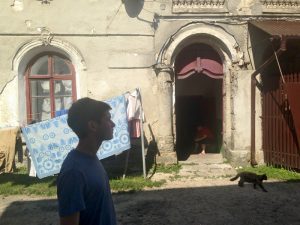
Standing for the good name of archives
 Yesterday the State Archives of the Lviv Region received anonymous letter denouncing my person. The unsigned, implicitly anti-semitic letter sent from Kyiv claimed that the archives should beware of my person, because i “work for the Israeli Ministry of Foreign Affairs” and “slander the good name” of the Ukrainian Archives.
Yesterday the State Archives of the Lviv Region received anonymous letter denouncing my person. The unsigned, implicitly anti-semitic letter sent from Kyiv claimed that the archives should beware of my person, because i “work for the Israeli Ministry of Foreign Affairs” and “slander the good name” of the Ukrainian Archives.
I am not used to discuss with cowards who are ashamed of their own name and thoughts, but I will make an exception.
- In 2010/2011 I was awarded a scholarship from Polish Bureau For Academic Recognition And International Exchange to conduct my academic research at the Hebrew University in Jerusalem. The scholarship was sponsored by the Israeli Ministry of Foreign Affairs.
There is huge difference between working for the Israeli MFA and getting scholarship from it. Beside this, I see nothing wrong in working for the Israeli MFA (just as for Ukrainian MFA). - This accusation referred to my earlier post on my visit to the State Archives of the Chernihiv Oblast, which took place in 2013. During this visit I was seriously misinformed and treated disrespectfully by some members of the staff of this archive. I found this situation very confusing, and below of any standards of any state institutions. Simply some of the employees did not represent the state institution in which they work in respectful way. Such situations should not be swept under the carpet. Defining a problem is the first step to cure it. Standing for high standards of services in providing by the archives is standing for their good name.
I must say that my second in the archive in 2015 went perfectly and the staff from the reading room as well as th management was extremely polite and cooperative.
Experts says that anonymous letters are usually written by not very bright people. Indeed, it requires minimal level of intelligence to distinguish scholarship from employment and to understand that honest critics of the archival services contributes after all to its improvement and good name (and not silent acceptance of lack of manners among state officials).
Management of the State Archives of the Lviv Region found this letter embarrassing for the archives and ensured me that they never consider anonymous letters. Thank you for your professional and respectful approach.
Dear anonymous person, we are eagerly looking forward for next denunciations. If you forget to sign them we will do this favor for you and publish your name. It wasn’t that hard to figure out who are you.

